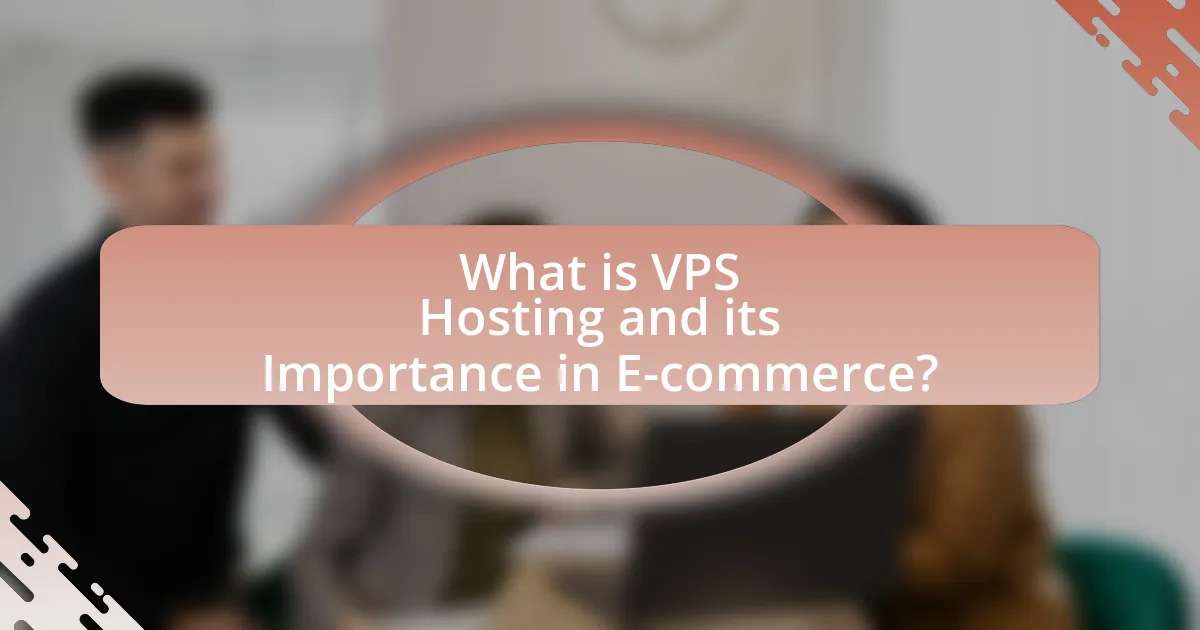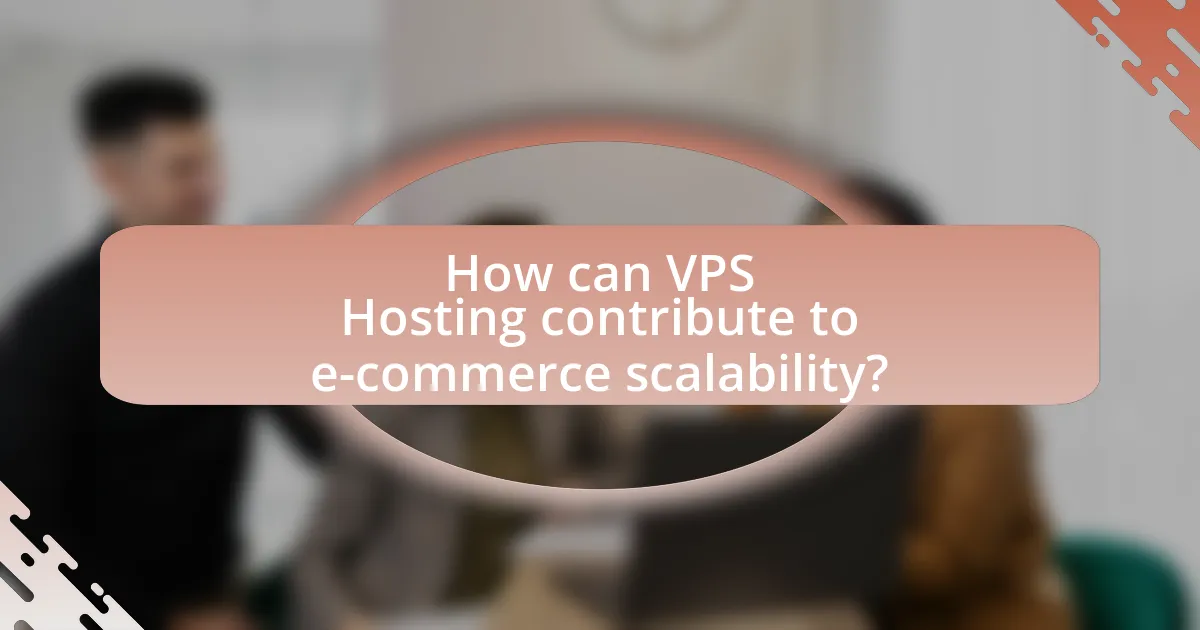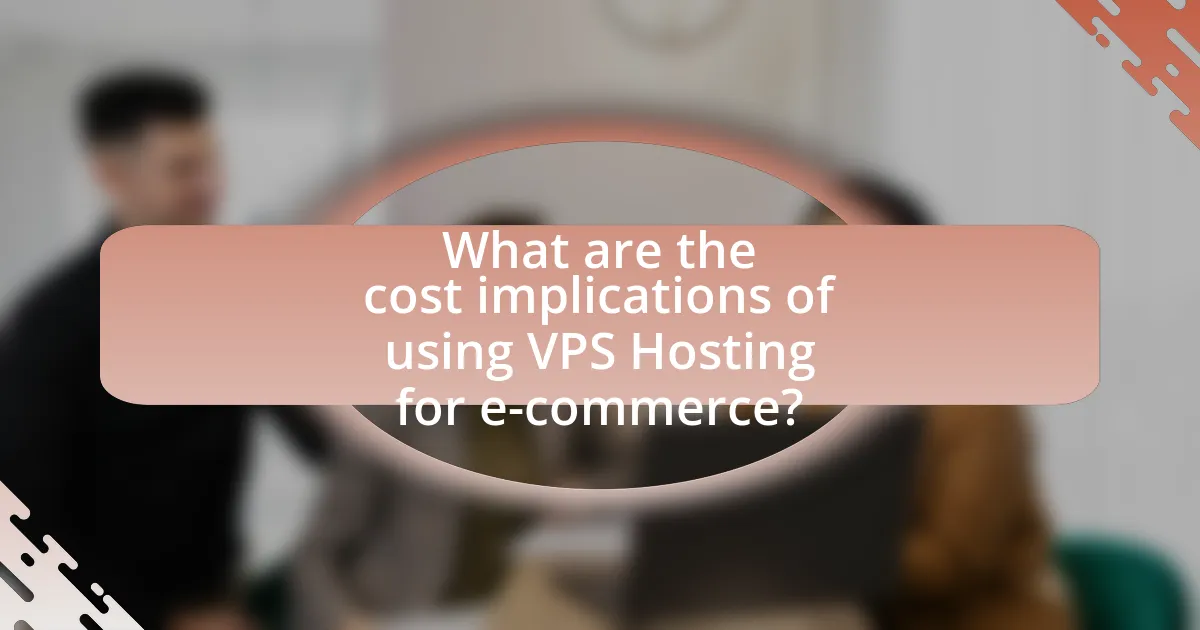VPS hosting, or Virtual Private Server hosting, is a crucial web hosting solution for e-commerce businesses, offering dedicated resources that enhance performance, security, and scalability. This article explores the significance of VPS hosting in e-commerce, detailing how it differs from other hosting types, its key features, and its impact on website performance, loading speed, and uptime. Additionally, it examines the security advantages VPS hosting provides for online transactions, its role in supporting high traffic during peak times, and the cost implications for businesses. The article also addresses common challenges associated with VPS hosting and offers best practices for optimizing its effectiveness in driving e-commerce success.

What is VPS Hosting and its Importance in E-commerce?
VPS hosting, or Virtual Private Server hosting, is a type of web hosting that provides dedicated resources on a virtual server, allowing businesses to have more control and flexibility compared to shared hosting. Its importance in e-commerce lies in its ability to offer enhanced performance, security, and scalability, which are critical for online businesses. For instance, VPS hosting can handle higher traffic volumes and provide faster loading times, which are essential for retaining customers and improving conversion rates. Additionally, VPS hosting allows for better security measures, such as isolated environments that protect sensitive customer data, which is vital for maintaining trust in e-commerce transactions.
How does VPS Hosting differ from other hosting types?
VPS hosting differs from other hosting types by providing dedicated resources within a shared environment, allowing for greater control and performance. Unlike shared hosting, where multiple users share the same server resources, VPS hosting allocates specific amounts of CPU, RAM, and storage to each virtual server, ensuring that one user’s activities do not impact another’s performance. Additionally, VPS hosting offers more customization options compared to shared hosting, enabling users to install their own software and configure settings according to their needs. In contrast to dedicated hosting, which involves renting an entire server, VPS hosting is more cost-effective while still delivering enhanced performance and reliability, making it a suitable choice for e-commerce businesses that require scalability and stability.
What are the key features of VPS Hosting?
VPS Hosting offers several key features that enhance performance and control for users. Firstly, it provides dedicated resources, such as CPU, RAM, and storage, which ensures consistent performance and reliability compared to shared hosting. Secondly, VPS Hosting allows for root access, enabling users to install and configure software as needed, which is crucial for tailored e-commerce solutions. Additionally, it includes scalability options, allowing businesses to easily upgrade resources as their traffic and demands grow. Security is another significant feature, as VPS environments are isolated from one another, reducing the risk of vulnerabilities affecting multiple users. Finally, VPS Hosting typically offers better uptime and support, with many providers guaranteeing 99.9% uptime and providing 24/7 technical assistance. These features collectively contribute to the effectiveness of VPS Hosting in supporting e-commerce success.
Why is VPS Hosting preferred for e-commerce platforms?
VPS hosting is preferred for e-commerce platforms due to its combination of dedicated resources, enhanced security, and scalability. E-commerce businesses require reliable performance and the ability to handle fluctuating traffic, which VPS hosting provides by allocating specific resources to each user, unlike shared hosting. Additionally, VPS hosting offers improved security features, such as isolated environments and customizable firewalls, which are crucial for protecting sensitive customer data and transactions. According to a study by HostingAdvice, 70% of e-commerce sites experience increased performance and security when utilizing VPS hosting compared to shared hosting solutions. This makes VPS hosting a strategic choice for e-commerce platforms aiming for success in a competitive market.
What role does VPS Hosting play in website performance?
VPS hosting significantly enhances website performance by providing dedicated resources that improve speed and reliability. Unlike shared hosting, where multiple websites compete for the same server resources, VPS hosting allocates specific amounts of CPU, RAM, and bandwidth to each user, ensuring consistent performance even during traffic spikes. This dedicated environment reduces latency and increases loading speeds, which are critical factors for user experience and search engine rankings. Studies show that a one-second delay in page load time can lead to a 7% reduction in conversions, highlighting the importance of optimized performance in e-commerce.
How does VPS Hosting impact website loading speed?
VPS hosting significantly enhances website loading speed by providing dedicated resources that are not shared with other users. This isolation allows for faster data processing and reduced latency, as the server can allocate CPU, RAM, and bandwidth specifically for a single website. Studies indicate that websites hosted on VPS can load up to 30% faster compared to shared hosting environments, where resources are often over-allocated and lead to slower performance during peak traffic times. This improved speed is crucial for e-commerce success, as faster loading times correlate with higher conversion rates and better user experience.
What are the effects of VPS Hosting on website uptime?
VPS hosting significantly enhances website uptime by providing dedicated resources and improved reliability compared to shared hosting. This dedicated environment minimizes the risk of downtime caused by resource contention with other websites, as each VPS operates independently. According to a study by HostingAdvice, VPS hosting can achieve uptime rates of 99.9% or higher, which is crucial for e-commerce success, as even a few minutes of downtime can lead to substantial revenue loss. Additionally, VPS hosting allows for better scalability and performance optimization, further contributing to consistent uptime during traffic spikes.
What security advantages does VPS Hosting offer for e-commerce?
VPS Hosting offers significant security advantages for e-commerce by providing isolated environments that enhance data protection and reduce vulnerabilities. Each VPS operates independently, which means that if one server is compromised, others remain secure, minimizing the risk of data breaches. Additionally, VPS Hosting typically includes advanced security features such as firewalls, DDoS protection, and regular security updates, which are crucial for safeguarding sensitive customer information and payment details. According to a report by Cybersecurity Ventures, e-commerce businesses face a high risk of cyberattacks, making these security measures essential for maintaining customer trust and compliance with regulations like PCI DSS.
How does VPS Hosting enhance data protection for online transactions?
VPS Hosting enhances data protection for online transactions by providing dedicated resources and improved security measures compared to shared hosting. With VPS, each virtual server operates independently, which minimizes the risk of data breaches caused by vulnerabilities in neighboring accounts. Additionally, VPS Hosting often includes advanced security features such as firewalls, DDoS protection, and regular backups, which further safeguard sensitive transaction data. According to a report by the Ponemon Institute, organizations that implement robust security measures, like those offered by VPS Hosting, can reduce the likelihood of data breaches by up to 50%.
What security features are typically included in VPS Hosting plans?
VPS hosting plans typically include security features such as firewalls, DDoS protection, and regular backups. Firewalls help to monitor and control incoming and outgoing network traffic based on predetermined security rules, effectively blocking unauthorized access. DDoS protection safeguards against distributed denial-of-service attacks, which can overwhelm a server with traffic, ensuring website availability. Regular backups provide a safety net for data recovery in case of data loss or corruption, allowing businesses to restore their systems quickly. These features collectively enhance the security posture of VPS hosting, making it a reliable choice for e-commerce operations.

How can VPS Hosting contribute to e-commerce scalability?
VPS hosting contributes to e-commerce scalability by providing dedicated resources that can be easily adjusted to meet fluctuating traffic demands. This flexibility allows online stores to handle increased visitor loads during peak shopping seasons without compromising performance. For instance, VPS hosting can support rapid scaling by enabling businesses to upgrade their server resources, such as CPU and RAM, on demand. According to a study by HostingAdvice, 70% of e-commerce businesses reported improved site performance and reliability after switching to VPS hosting, demonstrating its effectiveness in enhancing scalability.
What are the benefits of scalability in e-commerce?
Scalability in e-commerce allows businesses to efficiently manage increasing demand without compromising performance. This capability enables online retailers to expand their operations seamlessly, accommodating more customers and transactions as needed. For instance, during peak shopping seasons, scalable systems can automatically allocate additional resources, ensuring that website speed and reliability remain optimal. According to a study by the Harvard Business Review, companies that effectively implement scalable solutions can experience up to 30% growth in revenue during high-demand periods, demonstrating the tangible financial benefits of scalability in e-commerce.
How does VPS Hosting facilitate business growth?
VPS Hosting facilitates business growth by providing scalable resources, enhanced performance, and improved security. Businesses can easily adjust their server resources according to traffic demands, ensuring optimal performance during peak times, which is crucial for maintaining customer satisfaction and retention. According to a study by Statista, 70% of consumers abandon a website that takes more than three seconds to load, highlighting the importance of speed in e-commerce. Additionally, VPS Hosting offers dedicated resources that reduce downtime and improve website reliability, further supporting business operations. Enhanced security features, such as isolated environments and customizable firewalls, protect sensitive customer data, fostering trust and encouraging repeat business.
What are the limitations of shared hosting in terms of scalability?
Shared hosting has significant limitations in terms of scalability, primarily due to resource sharing among multiple users. This environment restricts the ability to allocate additional resources like CPU, RAM, and bandwidth as traffic increases, leading to performance degradation during peak times. For instance, if one website on a shared server experiences a surge in traffic, it can negatively impact the loading speed and availability of other sites on the same server. Additionally, shared hosting plans often have strict limits on the number of simultaneous connections and storage capacity, making it challenging for growing e-commerce businesses to expand their online presence effectively. These constraints highlight why many e-commerce platforms eventually transition to more scalable solutions like VPS hosting, which allows for dedicated resources and greater flexibility.
How does VPS Hosting support high traffic during peak times?
VPS Hosting supports high traffic during peak times by allocating dedicated resources to each virtual server, ensuring consistent performance even under heavy load. This isolation allows websites to handle increased visitor numbers without experiencing slowdowns or downtime. For instance, VPS Hosting typically provides guaranteed CPU, RAM, and bandwidth, which can be scaled up as needed. According to a study by HostingAdvice, VPS solutions can manage up to 1,000 concurrent users effectively, demonstrating their capability to sustain high traffic levels.
What strategies can be implemented to manage traffic spikes with VPS Hosting?
To manage traffic spikes with VPS Hosting, implementing load balancing is essential. Load balancing distributes incoming traffic across multiple servers, ensuring no single server becomes overwhelmed during peak times. Additionally, utilizing auto-scaling features allows for dynamic resource allocation based on real-time traffic demands, which can significantly enhance performance during sudden surges. Furthermore, optimizing website performance through caching mechanisms reduces server load by serving cached content to users, thereby improving response times. According to a study by Google, websites that load within five seconds have a 70% lower bounce rate, highlighting the importance of efficient resource management during traffic spikes.
How does resource allocation work in VPS Hosting during high traffic?
Resource allocation in VPS hosting during high traffic involves dynamically distributing CPU, RAM, and bandwidth among virtual servers to ensure optimal performance. When high traffic occurs, the VPS management system prioritizes resource allocation based on predefined limits and current demand, allowing for efficient handling of increased user requests. For instance, if a website experiences a surge in visitors, the VPS can allocate additional CPU cycles and memory to maintain speed and responsiveness, preventing downtime. This capability is supported by virtualization technology, which allows multiple virtual servers to operate on a single physical server while isolating their resources. Consequently, VPS hosting can effectively manage high traffic scenarios, ensuring that e-commerce platforms remain accessible and functional during peak periods.

What are the cost implications of using VPS Hosting for e-commerce?
Using VPS hosting for e-commerce typically incurs higher costs compared to shared hosting, with prices ranging from $20 to $100 per month depending on the resources allocated. This increased expense is justified by enhanced performance, security, and scalability, which are critical for handling traffic spikes and protecting sensitive customer data. For instance, VPS hosting offers dedicated resources, which can lead to faster load times and improved user experience, directly impacting conversion rates. Additionally, businesses may save on potential losses from downtime or security breaches, which can be financially devastating; a study by the Ponemon Institute found that the average cost of a data breach is $3.86 million. Thus, while the upfront costs of VPS hosting are higher, the long-term benefits can outweigh these initial investments.
How does VPS Hosting compare in cost to other hosting options?
VPS hosting typically costs more than shared hosting but less than dedicated hosting. Shared hosting can range from $2 to $10 per month, while VPS hosting generally starts around $20 and can go up to $100 per month, depending on resources. Dedicated hosting, on the other hand, usually costs between $80 and $300 per month. This pricing structure reflects the level of resources and control provided; VPS hosting offers a balance of affordability and performance, making it a popular choice for e-commerce businesses that require more reliability than shared hosting without the higher costs of dedicated servers.
What factors influence the pricing of VPS Hosting plans?
The pricing of VPS Hosting plans is influenced by several key factors, including resource allocation, performance specifications, and support services. Resource allocation refers to the amount of CPU, RAM, and storage provided, with higher allocations typically resulting in increased costs. Performance specifications, such as the speed of the network and the type of virtualization technology used, also play a significant role; for instance, SSD storage can elevate prices due to its superior speed compared to traditional HDD. Additionally, the level of customer support offered, including 24/7 availability and managed services, can further impact pricing, as more comprehensive support often comes at a premium.
How can businesses calculate the return on investment for VPS Hosting?
Businesses can calculate the return on investment (ROI) for VPS Hosting by comparing the financial benefits gained from using VPS against the costs incurred. To do this, businesses should first determine the total costs associated with VPS Hosting, including monthly fees, setup costs, and any additional expenses for maintenance or upgrades. Next, they should quantify the benefits, such as increased website performance, improved uptime, and enhanced security, which can lead to higher sales and customer satisfaction.
For example, if a business spends $100 per month on VPS Hosting and experiences a 20% increase in sales due to improved website performance, generating an additional $500 in revenue, the ROI can be calculated using the formula: ROI = (Net Profit / Cost of Investment) x 100. In this case, the net profit would be $400 ($500 revenue – $100 cost), resulting in an ROI of 400%. This method provides a clear financial picture of the effectiveness of VPS Hosting in driving e-commerce success.
What are the common challenges faced with VPS Hosting?
Common challenges faced with VPS Hosting include resource limitations, management complexity, and security vulnerabilities. Resource limitations arise because VPS plans often allocate a fixed amount of CPU, RAM, and storage, which can lead to performance issues if the allocated resources are insufficient for the website’s needs. Management complexity is another challenge, as users must handle server configurations, software updates, and troubleshooting, requiring technical expertise that not all users possess. Additionally, security vulnerabilities can occur if the server is not properly secured, making it susceptible to attacks, which is critical for e-commerce platforms that handle sensitive customer data. These challenges highlight the need for careful planning and management when utilizing VPS Hosting for e-commerce success.
How can businesses troubleshoot performance issues with VPS Hosting?
Businesses can troubleshoot performance issues with VPS Hosting by systematically analyzing resource usage, optimizing configurations, and monitoring server health. First, they should check CPU, RAM, and disk I/O usage through monitoring tools to identify bottlenecks. For instance, if CPU usage consistently exceeds 80%, it may indicate the need for a plan upgrade or resource allocation adjustments. Next, optimizing server configurations, such as adjusting web server settings or database queries, can enhance performance. Additionally, implementing regular monitoring of server health metrics, including uptime and response times, allows businesses to proactively address potential issues. According to a study by HostingAdvice, 70% of VPS users reported improved performance after optimizing their server settings, reinforcing the importance of these troubleshooting steps.
What are the best practices for managing a VPS Hosting environment?
The best practices for managing a VPS hosting environment include regular software updates, implementing strong security measures, monitoring resource usage, and creating backups. Regular software updates ensure that the operating system and applications are secure and functioning optimally, reducing vulnerabilities. Strong security measures, such as firewalls and intrusion detection systems, protect against unauthorized access and attacks. Monitoring resource usage helps identify performance bottlenecks and allows for timely upgrades or adjustments to resources. Creating backups ensures data integrity and availability in case of failures or data loss, which is critical for e-commerce operations. These practices collectively enhance the reliability and security of a VPS hosting environment, supporting the success of e-commerce initiatives.
What tips can enhance the effectiveness of VPS Hosting in e-commerce?
To enhance the effectiveness of VPS Hosting in e-commerce, businesses should prioritize resource allocation, optimize server configurations, and implement robust security measures. Properly allocating resources ensures that the e-commerce platform can handle traffic spikes, which is crucial during peak shopping seasons; for instance, a study by Statista indicates that e-commerce sales can increase by over 30% during holidays. Optimizing server configurations, such as using caching mechanisms and content delivery networks (CDNs), can significantly improve load times, leading to better user experiences and higher conversion rates. Additionally, implementing strong security measures, including SSL certificates and regular software updates, protects sensitive customer data, which is vital as 43% of cyber attacks target small businesses, according to the Verizon Data Breach Investigations Report.
How can businesses optimize their VPS Hosting setup for better performance?
Businesses can optimize their VPS hosting setup for better performance by implementing resource allocation strategies, utilizing caching mechanisms, and ensuring regular software updates. Properly allocating CPU and RAM resources according to application needs enhances processing speed and responsiveness. For instance, allocating more resources to high-traffic applications can significantly reduce load times.
Additionally, employing caching solutions like Varnish or Redis can decrease server load and improve response times by storing frequently accessed data in memory. Regularly updating the operating system and software ensures that the server benefits from performance improvements and security patches, which can prevent slowdowns caused by vulnerabilities.
According to a study by Google, a one-second delay in page load time can lead to a 20% decrease in conversions, highlighting the importance of optimizing VPS performance for e-commerce success.
What are the essential maintenance tasks for VPS Hosting users?
Essential maintenance tasks for VPS hosting users include regular software updates, security monitoring, data backups, resource management, and performance optimization. Regular software updates ensure that the operating system and applications are up-to-date, reducing vulnerabilities. Security monitoring involves checking for unauthorized access and malware, which is crucial for protecting sensitive e-commerce data. Data backups are essential to prevent data loss, with a recommended frequency of at least weekly. Resource management includes monitoring CPU, RAM, and disk space usage to ensure optimal performance. Performance optimization involves fine-tuning server settings and configurations to enhance speed and reliability, which is vital for maintaining a positive user experience in e-commerce.


